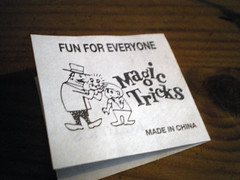Salesmanship has always been a little bit about hype. Putting a shine on what you’ve got. Painting it in the best possible light. You get the idea. But when it crosses a line, it becomes fooling your customers. Not only is it unethical, but it doesn’t really work very well anymore. The Internet makes it a lot harder to do than it once was, because you don’t have to fool just one customer. You have to fool all of them. Because if anyone figures out your trick, they tell everyone online. So, how good is your magic act?

Image by jonas_l via Flickr
All this was brought to mind last weekend as my wife looked over our credit card bill. She saw a small charge that just didn’t look right to her and she questioned me and our kids as to what this might be. No one knew.
So, she Googled the company and found out that we were in a club that made us eligible for discounts, but we paid every month for the privilege. That didn’t sound like a good deal, and she couldn’t figure out how we’d joined. The helpful folks she found online also explained how to get our money back.
So she called up and got an automated system that my wife used to cancel–but just as of this month. She knew from her online research that she needed to talk to a person to get the back months refunded. So she pressed the right buttons and talked to someone and found out we’d been charged for six months. Finally she prevailed on them to cancel all six months worth of charges.
Later that day, she saw this screen while she checked out of drugstore,com:

Then, the next day, she came across the same offer from Buy.com as she checked out. We have no idea if this is something that we originally did at drugstore.com or at buy.com, but if I were running those companies, I would be staying far away from this kind of relationship, because it depends on fooling customers.
My wife took the screen shots and passed it along to me and said, “Maybe it’s worth a blog post.” I threw the notes in my pile of blog ideas and figured I’d get to it soon. Then, U.S. Senate goes public implicating several companies with what they called “Click and Scam.”
Now understand, I am not saying that anything here was illegal—that’s not my area of expertise. I am just saying that most of the people signing up probably got suckered rather than really wanting to be in the club. So why would any company pass along customer credit card information to someone this unscrupulous? Money, pure and simple. They are willing to take a chance with the customer relationship for a few extra shekels.
Some of them are even today defending what they did and blaming the customers for being fooled. You can take that attitude, but I think you might be better served by a different approach.
My recommendation is that if you are trying these kinds of sharp business practices–stop. Drugstore.com and Buy.com and all of the others doing this, just stop. Now.
These tactics succeed only in alienating your customers and are not worth the small profits you make from them. Look at the bad publicity being doled out right here. How much does that hurt your company? That is what the Internet does, and it is how the equation has changed. Remember the old experession that you can’t fool all of the people all of the time? With the Internet, you have to.

![Reblog this post [with Zemanta]](http://img.zemanta.com/reblog_e.png?x-id=0816153e-91ac-410d-a1a6-74043e1d4b52)




